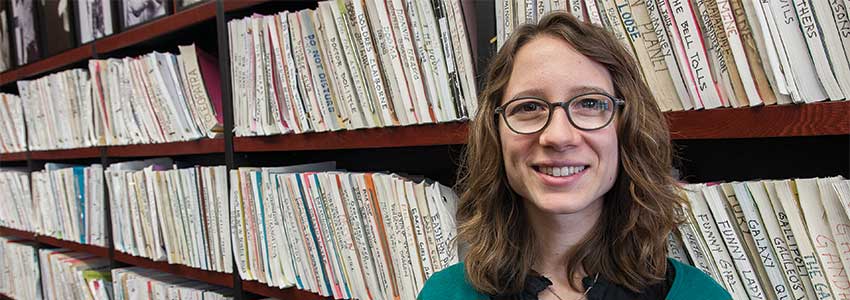“This is my third U-M degree,” Lia admits. Lia grew up in Southeastern Michigan with parents who were in public service law. Her parents invested long ago in a tuition program sponsored by the State of Michigan, the Michigan Education Trust (MET), so Lia’s undergraduate degree at a public Michigan university was paid for. She also admits that she applied only to U-M, saying, “I thought, why go elsewhere with this amazing deal? My older sister came to Ann Arbor and I saw that there were so many opportunities here. The idea of a public school meant a lot to me, that’s a big part of why I’m here.”
She majored in English and Asian Studies and pursued a Master’s in South Asian Studies. (“There are differing definitions for what counts as South Asia, but the general idea is that it’s the subcontinent marked off from East Asia by the Himalayan mountain range and dominated by the countries of Bangladesh, Pakistan, and India,” she explained.) She is now a Ph.D. student in Communication Studies. As a teenager, Lia and her mother were mildly obsessed with Bollywood films. She realized that much of the history and culture in the movies she watched were not a part of her K-12 education. This sparked a passion in her to create a better understanding of Asian cultures and history. After starting her Master’s work, however, she felt that “these Area Studies programs are really historically focused. That is important, but I wanted to study the daily negotiations of people today, how people think about and understand other cultures and how people from underrepresented groups, like South Asian Americans, use media in their own identity work. I’m focusing on media studies because it’s this key, everyday, ordinary site where these negotiations occur.”
Lia’s dissertation research examines three different platforms for digital diasporic media production and curation used by the South Asian American community. For example, the South Asian American Digital Archive combines “beautiful digitization of original documents that are left in the hands of their original owners with a heavily curated website. It offers rich, contextualized content so that anyone can get something from looking at political pamphlets from 1914 or pictures from the U-M campus in 2004. They work to maintain the artifacts and heritage of South Asian Americans while making a case for their place in the American saga. For instance, their recently re-launched First Days project allows people of all backgrounds to tell their personal stories of their first days in America while telling a powerful story about the place of people of South Asian heritage in America. By setting this archive up, they’ve set up the chance to create an experience in people’s present and make connections with complicated, historical realities.”
Lia was involved in the Rackham Institute for Social Change over the summer. She was taken with the way in which this is one part of a larger, thriving social change culture on campus. “There is such a breadth of perspectives there – so many options for engaged research. In the program, we spent a day in Hamtramck, a town with a working class history, a lot of hipsters, and a melting pot of Bengali, Polish, Yemeni and other ethnicities. We were thinking about what we could offer to the city in terms of suggestions on specific problems they have. It hit home that these were real people with real problems.”
In terms of applying that to her work, she says, “Research can feel very removed from real people and real problems. I especially find this when I’m sitting in front of a computer, sifting through a website like the digital archive. Then I talk to people and see how much this really means to them. It all comes together then. I see that information can be really responsive to communities and we need to determine how to make it useful and lasting.”
“Academia itself is going through a long, slow crisis, figuring out how it should be funded and who it should benefit. It’s such a luxury to get a graduate degree, and I’m really grateful, but that also means you need to think hard about who can benefit. I hope a lot of other people can benefit from my work as a researcher and a teacher.”
For fun, Lia enjoys cooking with friends. “I’ve taken up bicycling since I’ve been here, and since I’ve started grad school, I’m getting to know Ann Arbor in a different way. I’ve even learned to rock climb! And I love to send postcards. They are such interesting, cultural artifacts.”

